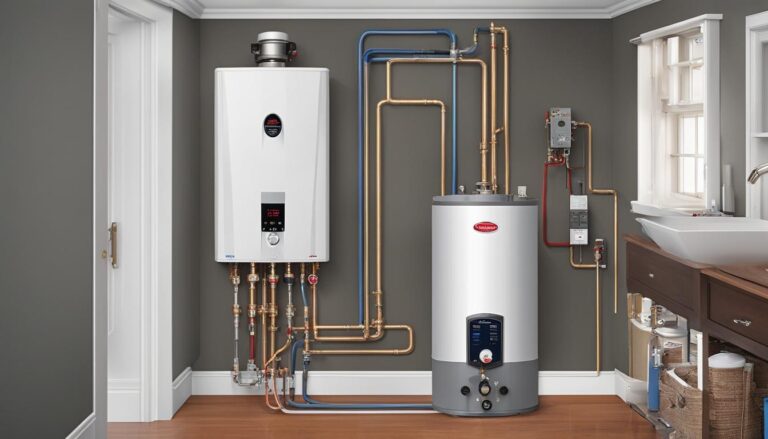Tankless Water Heater Services
Tankless water heaters have the advantage of requiring less frequent repairs compared to traditional models with storage tanks. However, occasional mechanical issues can still arise.
When you encounter problems, rely on the expertise of ResQ Plumbing for tankless water heater repairs in Las Vegas and Henderson.

Tankless Water Heater Repair Services
A tankless water heater is an excellent choice for meeting your family’s hot water demands efficiently, reducing energy costs, and ensuring continuous hot water availability. When issues arise with your water heater, you can rely on us for prompt and reliable tankless water heater repair in Las Vegas. We are equipped to address common problems such as:
- Burner issues
- Heating element malfunctions
- Poor venting in gas models
- Leaks
- Hard water buildup
It’s crucial to address these issues promptly. Early detection can often resolve problems like leaks or corrosion before they escalate, potentially requiring a full system replacement. If you notice any problem with your tankless water heater, we recommend contacting us for repair services.
Switch to a Tankless Water Heater for Endless Hot Water
Experience uninterrupted hot water with a tankless water heater installation from ResQ Plumbing. Unlike traditional models that store a finite amount of water, tankless heaters heat water instantly as needed, ensuring you never run out. This upgrade not only guarantees no more cold showers but also offers energy efficiency, space savings, and durability. Benefits include:
- Continuous hot water supply
- Energy savings from eliminating standby heat loss
- Compact design, saving space
- Longer lifespan compared to conventional heaters
- Lower risk of leaks and water damage
Tankless Water Heater Not Producing Hot Water
A common issue with tankless water heaters is insufficient hot water supply, often caused by simultaneous use of multiple hot water appliances overwhelming the unit’s capacity. If the problem persists even with just one appliance in use, it could indicate more serious issues such as a blocked vent or air intake, faulty ignitor, gas supply problems, or a clogged heat exchanger. These issues require professional diagnosis and repair to ensure your tankless water heater operates efficiently.
Resetting your Tankless Water Heater
Resetting a tankless water heater typically involves following these steps:
Turn Off Power: Locate the power source for your tankless water heater. This may involve shutting off the electrical breaker or turning off the gas supply if it’s a gas-powered unit.
Wait: Allow the unit to sit powered off for about 5 minutes. This gives the internal components time to reset.
Restart: After waiting, turn the power back on. For electric units, flip the breaker back on. For gas units, restore the gas supply and relight the pilot if necessary.
Check Operation: Once power is restored, monitor the unit to ensure it operates correctly. Check for error codes on the display panel, which can provide insights into any ongoing issues.
Consult Manual: If you encounter persistent problems or error codes after resetting, refer to the manufacturer’s manual for specific troubleshooting steps or contact a professional for assistance.
Resetting your tankless water heater can often resolve minor issues, but for complex problems, it’s best to seek professional help to avoid further complications.
Frequently Asked Questions
Is it worth switching to a tankless water heater?
If you want to save money in the long run, enhance your home's energy efficiency, and are open to a higher initial investment, a tankless water heater is an excellent choice. It's a smart, long-term investment for your home that may make you wish you switched sooner.
What is the downside of a tankless water heater?
The main downside of a tankless water heater is its higher cost—both for installation and the unit itself. Additionally, it may have limited hot water capacity compared to traditional tank heaters.
Can I replace my 40 gallon water heater with a tankless water heater?
Finally, a direct tank-less replacement for a 40 and sometimes 50-gallon tank that can be installed in the same time as a tank-type water heater is now available.
How big of a tankless water heater does my house need?
Before choosing and installing a tank-less water heater, it's important to size it correctly. Typically, you'll need around 3.5 GPM for 1-2 fixtures, 5 GPM for 2-3 fixtures, and 7 GPM for 3-4 fixtures running simultaneously.
Why do people not like tankless water heaters?
Tank-less water heaters are less favorable than traditional tanked heaters due to higher upfront costs, potential retrofitting needs, limited efficiency, repair challenges, potential bandwidth issues, delayed hot water delivery, and concerns during power outages.
How many years does a tankless water heater last?
A tank-less water heater can last between 15 to 20 years with proper maintenance and operation. In contrast, a standard tank water heater typically lasts 10 years or less.
Do you ever run out of hot water with a tankless water heater?
Tank-less water heaters ensure you won't run out of hot water, barring a power outage. However, they may struggle to keep up if multiple hot water sources are used simultaneously.
Can I take a long shower with a tankless water heater?
A tank-less water heater allows you to take a shower, run the dishwasher, and do laundry simultaneously without running out of hot water. This not only prevents cold showers but also saves money and energy.
Why is tankless water heater installation so expensive?
Installing a tank-less water heater may involve extra costs for venting pipes and potentially upgrading or installing a new gas line for gas-powered models due to their higher gas flow needs.
Should I replace my hot water heater with a tankless?
Tank-less water heaters typically last longer than tank-type heaters. While tank-type heaters generally last 10-15 years, tank-less heaters have an average lifespan of over 20 years. This longer lifespan can lead to significant long-term savings.
